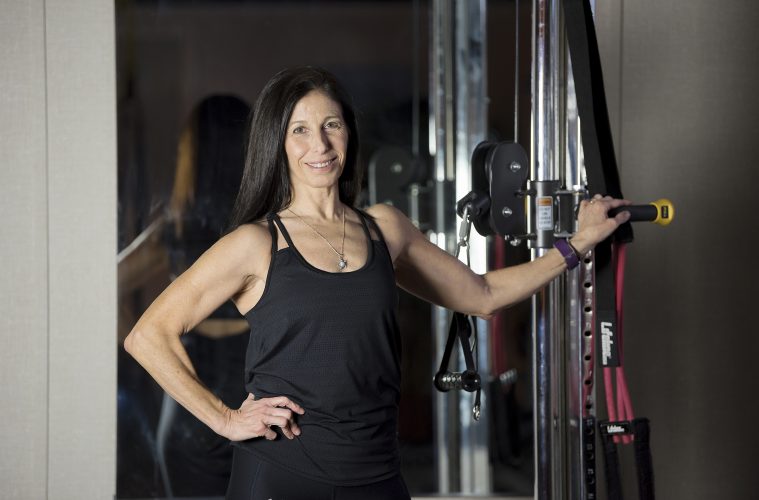When many people hear the term “personal trainer,” they picture someone pushing clients at the gym to lift more weights, run a little faster, or stretch a little deeper.
They might not picture someone who helps her clients organize their mobile calendar or teaches them about mindful eating. But that’s exactly the kind of thing that North Andover–based health coach Lisa Swanson, owner of Body & Soul Coaching and founder of Fit After 50 online group coaching, does for clients who need it.
She describes one busy client whose high-stress job and disorganized routine were roadblocks to wellness. “It was a matter of teaching him how to organize his calendar,” she says, adding that she also taught him and his wife how to sync their Google calendars and set aside time to review their calendars each week. She also encouraged him to take five-minute breaks during the workday and to involve their children in meal planning. “It’s really helping,” she says. “It all ends up falling into place.”
After decades in the fitness industry—working as an instructor and manager at large clubs, owning franchises throughout the area, and working as a personal trainer—Swanson decided that she wanted to provide more personalized one-on-one coaching. “I take pride in being able to teach people,” she says. “I don’t just want to motivate people and be a cheerleader.”
It was also important to Swanson to provide coaching to people with needs similar to her own. Swanson is 57 years old and says that so often, personal trainers—who are frequently much younger than their clients who are 50 and older—don’t really understand what
older adults are going through in their lives, both physically and mentally. Older adults want to get or stay in shape, increase their energy, avoid injuries, and stay active and independent.
Swanson loves being able to help people, and says she’s “fascinated about how much control we actually have over our own health and our bodies.”
Her customizable, flexible programs are available via in-person sessions at Swanson’s North Andover studio, as well as virtual sessions and email support. “The online coaching is fantastic; I love it,” Swanson says, adding that it provides a way for clients to have more access to her and their program resources. “It’s really hard to get results when you’re struggling to see a trainer twice a week or three times a week and nothing in between.”
Clients also have access to online tools such as a private client portal with a workout and nutrition journal, messaging capabilities, and how-to videos for every exercise. Those tools are also available via an accompanying app. Clients can even video themselves doing an exercise at home and share it with Swanson to ensure proper form.
The online element is just one of the ways that Swanson is conscious of people’s time. “I typically write up workouts that don’t take more than 30 minutes, and they’re efficient and they can do them at home,” she says.
At the heart of Swanson’s approach to fitness and wellness are programs that combine fitness, nutrition, and mindset. “You need the three-pronged approach,” says Swanson, who has the training to incorporate all three into her programs. She’s an ACE (American Council on Exercise) certified health coach, personal trainer, and orthopedic exercise specialist, as well as a Precision Nutrition certified level 1 nutrition coach. “One of my clients calls me the fitness trifecta,” she says.
For instance, one client had been struggling to lose 10 pounds despite exercising five to six days a week and believing that she ate well. A food log revealed to Swanson that her client clearly wasn’t getting the right nutrients, which caused her body to work sub-optimally.
“Within a couple of months I had her down 10 pounds and 6 percent body fat just by changing a few things around and adding in the nutrients she was missing,” Swanson says. “I don’t tell people what to eat or when to eat. I teach them the skills that are required for them to eat well.”
Other clients first need to work on the mindset of regular exercise and healthy eating. “They never mentally set themselves up for success,” Swanson says, pointing to another woman who built up to exercising over the course of several months, by first getting up and moving around rather than sitting all day, and then committing to walk her dogs. “We just slowly added things into her day,” she
says. “You’re getting these chains of successes in a row.”
Enter Thomas Arnold, 45, of Andover, the client who struggled to organize his busy calendar. Although he was active already, he describes Swanson’s work helping him to organize as the first step in helping him truly integrate fitness and wellness into his lifestyle. “It was no good to say I was going to work out somewhere if I wasn’t always taking care of the other aspects,” he says. From there, everything else has fallen into place.
“What better job is there?” Swanson asks. “You’re changing people’s lives and making them feel better about themselves,” she says.
Ten Tips from Lisa Swanson
Wellness Advice for optimal health
1 Eat mindfully
Even people who think they know how to eat sometimes don’t realize that they’re missing key nutrients or snacking a lot during the day. “Until they start logging their food, they don’t really know what they’re eating,” Swanson says. Awareness is the first step to making healthy changes.
2 Load up on vegetables
We get all our vitamins and minerals from vegetables. Without these key micronutrients our hormones will not be balanced, and we will not be able to convert our food into energy easily. Try adding 2 cups of vegetables to each meal. You’ll be pleasantly surprised with the outcome.
3 Take breaks during the day
If you sit all day, it’s important to take regular five-minute breaks to de-stress, stretch, and move throughout the day. Sitting for extended periods is now known to contribute to increased risk for type 2 diabetes, poor posture, reduced aerobic capacity, and elevated LDL.
4 Build your confidence with small successes
Slowly add changes to your routine to build new habits, such as adding protein to every meal or walking 10 minutes a day. Be sure you begin with steps you know you can be successful with at least 90 percent of the time. As your confidence grows, layer in more and more healthy habits.
5 Drink your water
If you do nothing else, get your water in! Every single function in your body needs water, including fat burning. Without adequate water, don’t expect to see a whole lot of change.
6 Diets aren’t the answer
“Stop looking for a diet,” Swanson says. Rigorous meal plans and fad diets aren’t the answer. “Forget the meal plan! Let’s teach you how to eat.” This approach will not only get the weight off but keep it off.
7 Get your beauty sleep
When you don’t get enough sleep, your leptin levels (the hormone responsible for feeling full) decrease and your ghrelin levels (the hormone responsible for feeling hungry) increase. The result? Your hunger increases and you don’t seem to get full. That’s on top of the fact that without adequate sleep, we tend to make poor choices.
8 Stop wasting hours on the treadmill
Jogging for an hour or more on the treadmill at a moderate pace will not get you lean. I know you’ve seen those people at the gym, and you also see that their bodies never change. In order to make a change, you need to switch it up, and you need to push yourself past your comfort zone. Try shorter-duration, higher-intensity workouts a few times per week.
9 Don’t be afraid to lift heavy
Most people fall into the trap of performing three sets of 15 repetitions. If you want a lean physique without bulk, you need to eat right and lift weights heavy enough to get your repetitions down to 8 or 10 without reaching muscle fatigue or failure. If you are new to this, I recommend hiring a professional to help you with both form and program design.
10 Don’t let fear of failure derail your success
People haven’t really failed if a fad diet hasn’t worked in the past. “The diet failed them,” Swanson says. Diets are meant to be a short-term fix. They’re unsustainable, and more important, they’re not created with your unique needs in mind.

